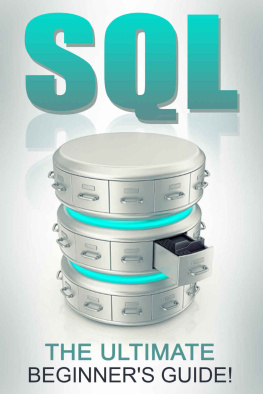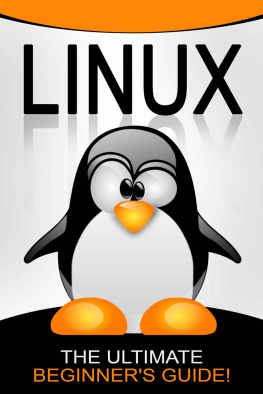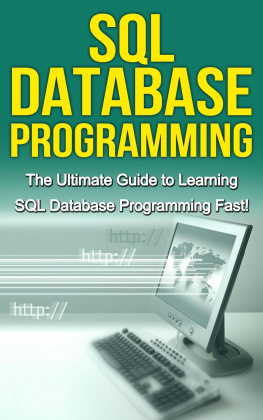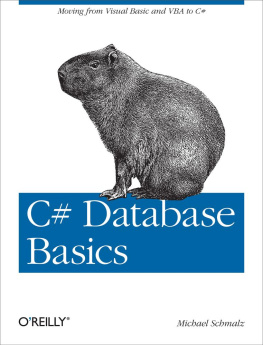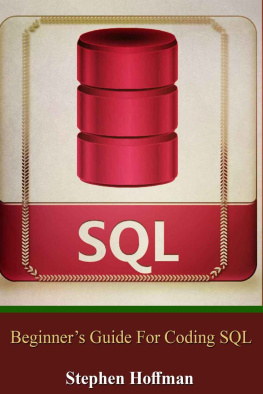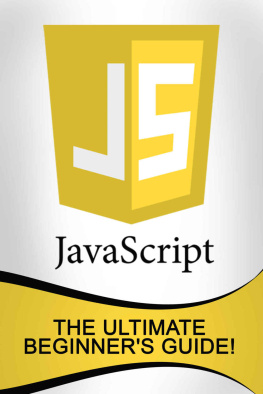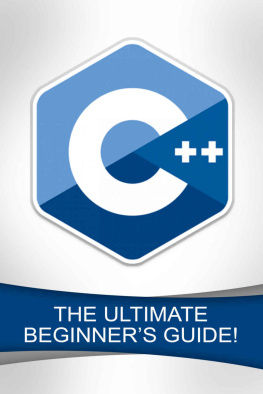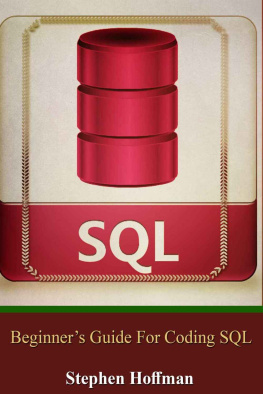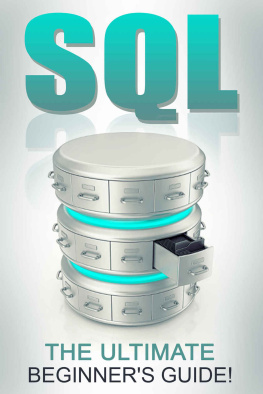Johansen - SQL The Ultimate Beginners Guide
Here you can read online Johansen - SQL The Ultimate Beginners Guide full text of the book (entire story) in english for free. Download pdf and epub, get meaning, cover and reviews about this ebook. year: 2015, genre: Business. Description of the work, (preface) as well as reviews are available. Best literature library LitArk.com created for fans of good reading and offers a wide selection of genres:
Romance novel
Science fiction
Adventure
Detective
Science
History
Home and family
Prose
Art
Politics
Computer
Non-fiction
Religion
Business
Children
Humor
Choose a favorite category and find really read worthwhile books. Enjoy immersion in the world of imagination, feel the emotions of the characters or learn something new for yourself, make an fascinating discovery.
SQL The Ultimate Beginners Guide: summary, description and annotation
We offer to read an annotation, description, summary or preface (depends on what the author of the book "SQL The Ultimate Beginners Guide" wrote himself). If you haven't found the necessary information about the book — write in the comments, we will try to find it.
SQL The Ultimate Beginners Guide — read online for free the complete book (whole text) full work
Below is the text of the book, divided by pages. System saving the place of the last page read, allows you to conveniently read the book "SQL The Ultimate Beginners Guide" online for free, without having to search again every time where you left off. Put a bookmark, and you can go to the page where you finished reading at any time.
Font size:
Interval:
Bookmark:
SQL
The Ultimate Beginners Guide!
Andrew Johansen
Copyright 2015 by Andrew Johansen- All rights reserved.
This document is geared towards providing exact and reliable information in regards to the topic and issue covered. The publication is sold with the idea that the publisher is not required to render accounting, officially permitted, or otherwise, qualified services. If advice is necessary, legal or professional, a practiced individual in the profession should be ordered.
- From a Declaration of Principles which was accepted and approved equally by a Committee of the American Bar Association and a Committee of Publishers and Associations.
In no way is it legal to reproduce, duplicate, or transmit any part of this document in either electronic means or in printed format. Recording of this publication is strictly prohibited and any storage of this document is not allowed unless with written permission from the publisher. All rights reserved.
The information provided herein is stated to be truthful and consistent, in that any liability, in terms of inattention or otherwise, by any usage or abuse of any policies, processes, or directions contained within is the solitary and utter responsibility of the recipient reader. Under no circumstances will any legal responsibility or blame be held against the publisher for any reparation, damages, or monetary loss due to the information herein, either directly or indirectly.
Respective authors own all copyrights not held by the publisher.
The information herein is offered for informational purposes solely, and is universal as so. The presentation of the information is without contract or any type of guarantee assurance.
The trademarks that are used are without any consent, and the publication of the trademark is without permission or backing by the trademark owner. All trademarks and brands within this book are for clarifying purposes only and are the owned by the owners themselves, not affiliated with this document.
Table of Contents
Introduction
Chapter 1: SQL The Basics
Chapter 2: The SQL Commands That You Can Use
Chapter 3: Data Types
Chapter 4: How to Manage Database Objects
Chapter 5: Database Normalization
Chapter 6: Data Manipulation
Chapter 7: How to Manage Database Transactions
Chapter 8: How to Get Excellent Results from Database Queries
Chapter 9: Categorize Information Using Database Operators
Conclusion
Introduction
I want to thank you and congratulate you for getting my book
SQL: The Ultimate Beginners Guide!
This book will teach you the basics of SQL and database operations. Since SQL is a language used to manage databases, you have to familiarize yourself with its basics and nuances. Dont worry if you have never used SQL before: this book will turn you from a beginner to an efficient SQL-user.
This book will cover important topics about SQL. For instance, a chapter focuses on the operators that you can use. Another chapter, however, concentrates on giving you accurate results from your database queries. Overall, youll be an effective SQL user after reading this book.
Thanks again for getting a copy of this book, I hope you enjoy it!
Chapter 1: SQL The Basics
Every company generates, holds, and uses data. Thus, companies need an organized way of storing information. This organized way is known as DBMS (i.e. Database Management System). Business organizations have been using these database systems for years.
At first, these systems were extremely simple. With the modern technology, however, database management systems have evolved. Even the most basic ones have powerful features you can take advantage of. The DBMSs youll see today can store large amounts of data and access the internet.
The new breed of data management is often implemented using an RDBMS (i.e. Relational Database Management System). This is derived from the classic DBMS. Relational database systems often have Web and server/client technologies. That means they can help businesses in managing various types of information and staying competitive in todays market.
This book will teach you how to use SQL and relational databases. By reading this book, youll learn how to manage large amounts of data using SQL.
What Is SQL?
SQL stands for Structured Query Language. This is the basic language used to interact with databases. The original version was created by IBM during the 70s. During 1979, right after IBM released the prototype, Relational Software Inc. published the first SQL tool in the world. They called this product ORACLE. This product became so successful the entire company is now called Oracle Corporation. Today, ORACLE is one of the leaders in database technologies.
You can pronounce SQL in two ways:
1. Read the letters one by one, as in S-Q-L
2. Read the letters as Sequel
Modern users prefer the second way of pronouncing the name. Basically, you will use SQL to tell a database about your needs and wants. This process is similar to ordering food in a restaurant: you can utilize SQL to get the information you need.
Databases
Simply put, databases are groups of information. Some people consider databases as organized mechanisms that can store information, through which users can access data efficiently and effectively.
You are actually using databases without knowing it. A phonbook is considered as a database it contains information about peoples names, phone numbers, and physical addresses. The information is presented in alphabetical order, which allows you to find certain pieces of data easily.
Here is an image of a simple database:

Relational Databases An Introduction
This is a database segregated into tables or logical units. These tables are interconnected inside the database. Relational databases allow you to break data into smaller units. Thus, you can easily maintain your database and optimize it based on the needs of your organization. Heres a visual representation of a relational database:

Client/Server Technology An Introduction
Previously, mainframe computers dominated the computer industry. Mainframe computers are machines that possess large, robust systems capable of storing and processing information. People interacted with mainframe computers using dumb terminals (i.e. terminals not capable of thinking on their own). To perform their functions, dumb terminals relied on the computers storage, memory, and processor. This setup worked excellently. Actually, some companies are still using them in their business operations. However, a better solution was developed: the client/server technology.
In client/server systems, the main computer (i.e. the server) can be accessed using a network usually a WAN (wide area network) or a LAN (local area network). Users typically access the server using desktop computers or other servers, rather than dumb terminals. Every computer, referred to as a client, has access to the system, enabling interaction between the server and the client/s.
The major difference between mainframe and client/server environments is that with the latter, the users computer can think on its own and run its own applications. Because of these features, client/server environments are preferred by modern businesses and non-profit organizations.
Heres a visual representation of a client/server setup:

Font size:
Interval:
Bookmark:
Similar books «SQL The Ultimate Beginners Guide»
Look at similar books to SQL The Ultimate Beginners Guide. We have selected literature similar in name and meaning in the hope of providing readers with more options to find new, interesting, not yet read works.
Discussion, reviews of the book SQL The Ultimate Beginners Guide and just readers' own opinions. Leave your comments, write what you think about the work, its meaning or the main characters. Specify what exactly you liked and what you didn't like, and why you think so.

